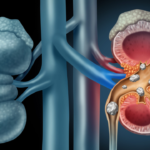
Welcome to a valuable resource on maintaining renal health. Your kidneys play a vital role in filtering waste and excess fluids from your body, so it’s crucial to keep them in top condition. In this article, we’ll delve into essential lifestyle tips to ensure your kidneys stay healthy and functional.
The Importance of Kidney Health
Our kidneys are unsung heroes, tirelessly working to remove toxins from our bodies. To keep your kidneys functioning optimally, it’s essential to adopt a few simple lifestyle changes.
Incorporating a Balanced Diet
Eating well is the cornerstone of kidney health. Consume a diet rich in fruits, vegetables, whole grains, and lean proteins. This ensures a proper balance of nutrients while reducing the risk of kidney stones and other complications.
Stay Hydrated
Adequate hydration is crucial for maintaining kidney health. Drinking enough water helps flush out waste and toxins. Aim for at least eight glasses of water per day.
Monitor Blood Pressure
High blood pressure can damage your kidneys over time. Regularly check your blood pressure and, if necessary, consult your healthcare provider for proper management.
Reduce Sodium Intake
Excessive sodium can raise blood pressure and harm your kidneys. Limit your salt intake and opt for low-sodium alternatives in your meals.
Avoid Overuse of Pain Medication
Non-prescription pain relievers, such as ibuprofen and aspirin, can harm your kidneys when used excessively. Consult with a healthcare professional for alternatives.
Quit Smoking
Smoking can lead to kidney damage and exacerbate existing kidney problems. Quitting smoking is one of the best decisions you can make for your kidney health.
Maintain a Healthy Weight
Being overweight can strain your kidneys. Focus on achieving and maintaining a healthy weight through a balanced diet and regular physical activity.
Exercise Regularly
Physical activity helps reduce the risk of chronic kidney disease. Aim for at least 150 minutes of moderate-intensity exercise per week.
Manage Diabetes
Diabetes is a leading cause of kidney disease. If you have diabetes, work closely with your healthcare team to manage your blood sugar levels.
Limit Alcohol Consumption
Excessive alcohol intake can stress your kidneys. Enjoy alcohol in moderation, and always be mindful of your consumption.
Control Cholesterol Levels
High cholesterol can lead to kidney damage. Implement a heart-healthy diet and, if necessary, take medications as prescribed by your doctor.
Manage Stress
Chronic stress can affect your overall health, including your kidneys. Practice stress-reduction techniques such as meditation, yoga, or deep breathing exercises.
Avoid Excessive Caffeine
High caffeine consumption can lead to high blood pressure. Be mindful of your caffeine intake, and opt for decaffeinated options when possible.
Get Sufficient Sleep
Adequate sleep is essential for overall health. Aim for 7-8 hours of quality sleep each night to support your kidneys.
Kidney-Friendly Foods
Incorporate kidney-friendly foods like berries, fish, and olive oil into your diet. These foods provide essential nutrients and support kidney function.
FAQs
Can kidney health be improved through lifestyle changes?
Yes, adopting a healthy lifestyle can improve kidney health and prevent kidney-related issues.
What foods should I include in my kidney-friendly diet?
Include berries, fish, and olive oil in your diet, as these are beneficial for kidney health.
How does high blood pressure affect the kidneys?
High blood pressure can damage the blood vessels in the kidneys, reducing their ability to function properly.
Is it necessary to consult a doctor before making lifestyle changes for kidney health?
It’s advisable to consult a healthcare professional, especially if you have pre-existing health conditions.
Why is quitting smoking important for kidney health?
Smoking can damage blood vessels and decrease blood flow to the kidneys, leading to kidney problems.
Can stress negatively impact kidney health?
Yes, chronic stress can affect overall health, including kidney function. Reducing stress is beneficial for kidney health.
Conclusion:
In conclusion, maintaining healthy kidneys is of paramount importance for your overall well-being. Your kidneys tirelessly perform the critical function of filtering waste and toxins from your body. To safeguard their health and functionality, it’s essential to embrace a series of lifestyle changes.
These changes encompass adopting a balanced diet, staying well-hydrated, monitoring and managing blood pressure, limiting sodium intake, avoiding excessive pain medication use, quitting smoking, maintaining a healthy weight, engaging in regular exercise, managing diabetes, controlling alcohol consumption, regulating cholesterol levels, managing stress, moderating caffeine consumption, and ensuring sufficient sleep.
Incorporating kidney-friendly foods like berries, fish, and olive oil into your diet can also offer valuable support to your kidneys.
Remember that while lifestyle changes can enhance kidney health, it’s prudent to consult with a healthcare professional, especially if you have pre-existing health conditions. These measures, in conjunction with guidance from experts like Dr. Dhake, will help ensure your kidneys function optimally, allowing you to enjoy a healthier and more fulfilling life. Your kidneys play a crucial role in your overall health, and their care should not be taken lightly.




